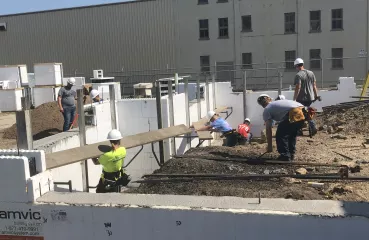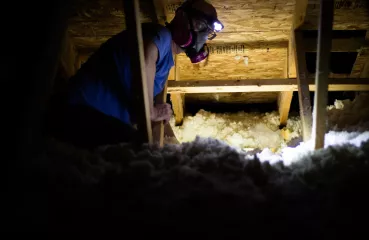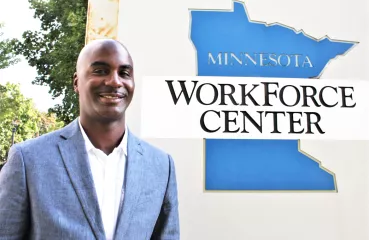Kristina Foley: The COVID-19 pandemic has thrown a huge curve into everyone’s life, and as a manager, it’s been important for me to keep a cohesive team and keep our technicians safe. Every site where we have solar arrays is different and every problem we face is different. Our team does video calls in the morning and at the end of the day, talking and collectively problem-solving as a group. What materials do we need? How can we use each other as resources? What did we find, what did we fix, and what do we have to go back to do? We’re based in Saint Paul, but the team works in Minnesota, Wisconsin, Iowa, and beyond. We’ve had to navigate different public health rules, hotspots, and mask requirements throughout our service territory. Some places have been more shut down than others, so that has complicated our work. There are new things to navigate every day.
The rest of my day is working with customers and taking care of internal requests. I’m doing contracts, invoicing, following up on materials with contractors and distributors, getting warranty claims on products, working internally with our operations department, install crews, and project coordinators on service upgrades. These can include a customer wanting to add panels or install an electric vehicle charger or additional items like snow guards to protect their panels, or a new monitoring system. I can help our team with those requests. Working in a service role like this, you need to know a bit of everything and ask lots of questions.
Every customer and every situation is different. It’s not the same thing you’re doing—it’s not the same call after call. I’ve enjoyed being able to resolve problems with customers. They can be really happy and satisfied when they understand more. Solar is not inexpensive, it’s an investment. Even with financing to pay monthly, there is still an additional cost, but for customers to look at their utility statements and to see the impact that solar is having, that’s great.
Sergio Navas: Managing all the different tasks that come with running a new business has been really rewarding. I’m working with clients, doing the actual drone piloting work in the field, and then working on marketing and videos of these services for social media, too, including on LinkedIn, Facebook, and Instagram.
Since finishing the program, I have been going out and doing the work, a lot of which is showing up and networking. Through the program at Century College and Scott Randall’s network, I have been able to connect with a lot of people in the solar industry, which is great. I get to pitch and share what I’m doing—some in the industry are excited and others have questions. I’m also in a position to pay it forward by helping other Century College students.
Educating those I work with about drone applications in the industry has still been a challenge. Some are skeptical and don’t know how to incorporate drones into their workflow. Introducing a new technology like this can make it difficult, but there are opportunities for us all to learn and adapt. I’m the kind of person who wants everything to happen at once, so I admit that I can sometimes be impatient wanting to see all of this change happen, but I’m seeing progress in my business and in the industry too, which is encouraging.










